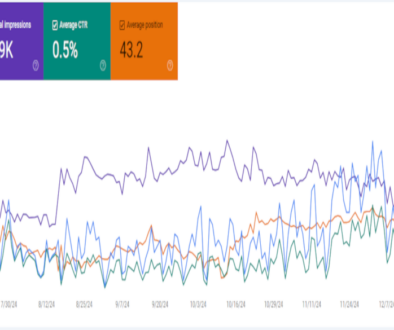Unlock the Secret Sauce to Dominate Local SEO and Skyrocket Your Rankings
Are you struggling to make your local business visible online? It’s an open secret that 46% of Google searches have a ‘local intent’. Our blog post is here to guide you through the best strategies to boost your local SEO and improve your rankings.
Ready for a surge in visibility, traffic, and sales? Dive in!
Key Takeaways
- Local SEO, or optimizing your online presence for local searches, is important because it helps customers in your area find your business more easily.
- Claiming and optimizing your Google My Business listing can improve your local SEO by engaging with customers through social media posts and ensuring maximum visibility in local search results.
- Consistency in name, address, and phone number (NAP) across online platforms is crucial for local SEO success as it helps search engines understand and verify your business’s details.
- Conducting a local SEO audit can help identify areas for improvement in on – page elements, internal linking structure, NAP consistency, and online directories/citations to enhance visibility in local search results.
What is Local SEO and Why is it Important?
Local SEO, or local search engine optimization, refers to the process of optimizing a website’s online presence to attract more local customers and improve its rankings in local search results.
It is important for businesses because it helps them target potential customers in their specific geographical area, increasing their chances of generating leads and driving foot traffic to their physical location.
Definition of local SEO
Local SEO makes your website show up more in local search results. It helps people who live near you find your business on the web. Think about when someone searches for a place to eat or shop on their phone.
Your store or restaurant will be one of the first they see if you use local SEO right. This is good because then these people might come to your business!
Importance of local SEO for businesses
Local SEO is key for any business. It helps people close by find your store or service fast. A good local SEO can make your site show up when local customers search online. This means more clicks, calls, and customers for you.
Plus, it gives you an edge over big brands that don’t focus on local SEO! Just think of all the new faces in your store because they found you first online. That’s what makes improving your local rankings so important.
Optimizing Google Business Profile
To improve your local SEO, it is crucial to claim and optimize your Google My Business listing. By doing so, you can engage with customers through social media posts on GBP, ensuring maximum visibility for your business in local search results.
Claiming and optimizing your GBP listing
Making the most out of your Google Business Profile (GBP) listing is key to improving local SEO. Here are some steps to get started:
- Claim your GBP listing. This is the first step towards boosting your local rankings.
- Make sure all data is complete and correct. All information about your business must be up-to-date.
- Use a consistent name, address, and phone number. This helps Google understand and trust your business more.
- Add high – quality pictures of your business place. Photos can attract more customers to check out your listing.
- Collect and respond to customer reviews. Positive reviews can make your business look better in Google search results.
- Keep the GBP account active by adding posts regularly.
- Monitor and learn from what people are asking on your competitors’ Google Business Profile Q&As.
- Tweak a Google Product Listing if needed to draw in new costumers.
Engaging on social media and adding posts to GBP
Engaging on social media and adding posts to your Google My Business (GBP) listing can significantly improve your local SEO. Here are some ways to do it:
- Share updates and promotions: Regularly post updates, promotions, and special offers on your GBP profile. This keeps customers informed and engaged.
- Respond to reviews and comments: Engage with your audience by responding to customer reviews and comments on GBP. Thank them for positive feedback and address any concerns or issues promptly.
- Use hashtags: When sharing posts on social media platforms, include relevant hashtags related to your business, location, or industry. This helps increase visibility and reach a wider audience.
- Encourage user-generated content: Encourage your customers to share their experiences with your business by tagging you in their social media posts or using specific hashtags. Reposting this content on your GBP profile can showcase the positive interactions people have with your brand.
- Post photos and videos: Visual content is more engaging, so share high-quality photos and videos of your products, services, or behind-the-scenes moments on social media platforms and GBP.
Consistency in Name, Address, and Phone Number (NAP)
Consistency in name, address, and phone number (NAP) is crucial for local SEO success.
Importance of consistent NAP across online platforms
Consistency is key when it comes to your business’s name, address, and phone number (NAP) across online platforms. Having consistent NAP information helps search engines understand and verify your business’s details, which can improve your local SEO rankings.
When your NAP is inconsistent or outdated on different platforms, it can confuse both customers and search engines. Make sure to update and maintain accurate NAP across directories and citations to ensure that potential customers can easily find and contact your business.
Optimizing online directories and citations
To improve your local SEO, it’s important to optimize online directories and citations. Here’s how:
- Ensure that your business information is consistent across all online directories and platforms.
- Claim your listings on popular directories like Yelp, YellowPages, and TripAdvisor.
- Provide accurate and up-to-date information about your business, including the name, address, and phone number (NAP).
- Add relevant keywords to your business descriptions in online directories.
- Encourage happy customers to leave reviews on these platforms to boost your local SEO rankings.
- Monitor and respond to customer reviews to show engagement and build trust with potential customers.
Local SEO Audit and Analysis
Perform a comprehensive local SEO audit to identify areas for improvement and analyze the effectiveness of your current strategies.
Performing a local SEO audit
Performing a local SEO audit can help businesses identify areas for improvement in their local search engine optimization. Here are some key steps to take:
- Review your website’s on – page elements, such as URL structure, title tags, headers, meta descriptions, and content. Make sure they are optimized with relevant keywords.
- Check the internal linking structure of your website. Ensure that it is logical and helps both users and search engines navigate your site effectively.
- Assess the consistency of your Name, Address, and Phone Number (NAP) across all online platforms. Consistent NAP information is crucial for local rankings.
- Analyze your online directories and citations to verify that they have accurate and up-to-date information about your business.
- Use tools like Google Analytics and Google Search Console to track your website’s performance in terms of traffic, user engagement, and visibility in local search results.
Improving internal linking structure
Improving your website’s internal linking structure is an important aspect of local SEO. It helps search engines understand the hierarchy and relationship between different pages on your site, improving overall user experience and search engine visibility. Here are some ways to improve your internal linking structure:
- Include relevant anchor text: Use descriptive anchor text that includes relevant keywords when linking to other pages on your website. This helps search engines understand the context and relevance of the linked page.
- Create a clear navigation menu: Design a clear and user-friendly navigation menu that allows visitors to easily navigate through different sections of your website. This makes it easier for both users and search engines to find and index important pages.
- Use breadcrumb navigation: Breadcrumb navigation provides additional context to users and search engines by displaying the hierarchical structure of a website, making it easier for them to navigate back to higher-level pages.
- Interlink related content: Look for opportunities to link related articles or pages within your content. This not only helps users discover more relevant information but also improves the crawlability and indexing of those linked pages by search engines.
- Update broken links: Regularly check for broken links on your website and fix them promptly. Broken links can negatively impact user experience and make it difficult for search engines to crawl and index your site properly.
- Use sitemaps: Create XML sitemaps that provide a complete list of all the pages on your website, including any location-specific landing pages, making it easier for search engines to discover and index them.
On-page Optimization for Local SEO
Optimize your URL, title tags, headers, meta description, and content to improve your local SEO rankings. Add location pages to your website for better visibility in local search results.
Optimizing URL, title tags, headers, meta description, and content
To improve your local SEO, optimize the following elements on your website:
- URL: Use short and descriptive URLs that include relevant keywords.
- Title tags: Create unique and compelling titles for each page, including location-specific keywords.
- Headers: Use header tags (H1, H2, etc.) to structure your content and make it easier for search engines to understand.
- Meta description: Write concise and persuasive meta descriptions that include local keywords and accurately describe the page’s content.
- Content: Create high-quality, informative, and locally-focused content that incorporates relevant keywords naturally.
Adding location pages to your website
To improve your local SEO, consider adding location pages to your website. These pages provide valuable information for potential customers and help search engines understand where your business operates. Here’s what you need to know:
- Location-specific details: Include the name, address, phone number (NAP), and operating hours of each of your business locations on these pages. This consistent information will boost your local rankings.
- Unique content: Each location page should have unique content that highlights the specific offerings, services, and products available at that location. This will help search engines match relevant results to users’ searches.
- Optimize meta tags: Be sure to optimize the title tags, headers, meta descriptions, and URLs of these location pages with relevant keywords. This will make it easier for search engines to index and rank them.
- Embed a map: Consider embedding a Google Map on your location pages to provide visual cues for visitors trying to find your business.
- Link internally: Include links from other related pages on your website to these location pages. This internal linking structure helps search engines crawl and understand the importance of each page.
Creating Local Content
Creating localized content is crucial for improving local SEO and attracting local customers to your business. By creating content that is tailored to your specific location, you can better engage with your target audience and increase your online visibility in the local search results.
Importance of creating localized content
Creating localized content is crucial for improving your local SEO rankings. When you create content that is specific to your target audience’s location, it helps search engines understand the relevance of your website to local searches.
Additionally, localized content allows you to connect with potential customers on a more personal level by addressing their specific needs and interests in their local area. By including location-specific keywords and information in your content, you can enhance your visibility in local search results and attract more targeted traffic to your website.
Remember, creating relevant and valuable localized content not only improves your SEO but also establishes credibility and trust with your local audience.
Strategies for creating local content
To create local content that helps boost your local SEO, consider the following strategies:
- Conduct Local Keyword Research: Identify keywords and phrases that are relevant to your local area and incorporate them into your content.
- Highlight Local Events and News: Write articles or blog posts about upcoming events, news stories, or community initiatives in your area.
- Showcase Local Testimonials and Success Stories: Share success stories from satisfied customers in your locality to build trust and credibility with potential customers.
- Create Location-specific Landing Pages: Develop landing pages that target specific geographic areas within your locality to attract local search traffic.
- Feature Local Experts or Influencers: Collaborate with local experts or influencers in your industry to contribute guest posts or participate in interviews.
- Provide Useful Local Guides and Resources: Create comprehensive guides or resources related to your industry that provide valuable information for locals.
- Utilize Local Images and Videos: Include images and videos of local landmarks, businesses, events, or customer testimonials to enhance the engagement of your content.
- Collaborate with Other Local Businesses: Partner with other local businesses for co-marketing opportunities such as joint content creation or cross-promotion.
- Optimize Your Content for Local Search Queries: Use location-based keywords in titles, headers, URLs, and meta descriptions to help search engines understand the relevance of your content to a specific locality.
- Promote Your Content Locally: Share your content on local social media groups, directories, forums, and online communities frequented by locals.
Mobile Optimization
Optimizing your website for mobile devices is crucial for local SEO success. Ensure that your site is mobile-friendly and responsive, allowing users to easily navigate and access information on their smartphones and tablets.
The significance of mobile-friendly websites for local SEO
Mobile-friendly websites are crucial for local SEO because the majority of people now use their mobile devices to search for local businesses and services. If your website is not optimized for mobile, it can lead to a poor user experience, high bounce rates, and lower rankings in local search results.
Studies have shown that users are more likely to engage with and convert on a website that provides a seamless mobile experience. By ensuring that your website is responsive and easy to navigate on smartphones and tablets, you can improve your chances of appearing higher in local search rankings and attract more potential customers to your business.
Tips for optimizing your website for mobile devices
- Make sure your website is mobile – friendly by using a responsive design that adjusts to different screen sizes.
- Optimize your website’s loading speed for mobile devices by minimizing large images and avoiding excessive use of plugins or scripts.
- Use large and easily readable fonts on your mobile website to ensure that users can read the content without zooming in.
- Keep your navigation simple and easy to use on mobile devices, with clear menus and intuitive icons.
- Ensure that your buttons and links are large enough for users to tap with their fingers without accidentally tapping nearby elements.
- Optimize your images for mobile by compressing them and using appropriate file formats like JPEG or PNG.
- Avoid using pop – ups or interstitial ads that can interrupt the user experience on mobile devices.
- Implement schema markup to provide additional information about your business on search engine results pages, which can be particularly helpful for users on mobile devices.
- Test your website on multiple mobile devices and screen sizes to ensure it looks good and functions properly across different platforms.
- Monitor your website’s performance on mobile devices using analytics tools, and make adjustments as needed based on user behavior data.
Sources:
- Important Facts: 2 (“Mobile optimization is crucial for local SEO, as a majority of searches are now conducted on mobile devices.”)
- Important Facts: 8 (“Implementing a content marketing strategy can also contribute to better local SEO rankings.”)
Building High-Quality Backlinks
To improve your local SEO and boost your local rankings, it’s crucial to focus on building high-quality backlinks from relevant and authoritative websites.
Importance of relevant and authoritative inbound links
Having relevant and authoritative inbound links is crucial for improving your local SEO rankings. When other reputable websites link back to your website, search engines see this as a positive signal of credibility and trustworthiness.
Additionally, these inbound links can drive traffic directly to your site from the referring website, expanding your online visibility. Remember that it’s not just about the quantity of inbound links, but also the quality.
The more relevant and authoritative the linking sites are to your industry or location, the greater impact they will have on boosting your local rankings.
Strategies for acquiring high-quality backlinks
Acquiring high-quality backlinks is important for improving your local SEO. Here are some strategies to help you get them:
- Guest Blogging: Write valuable content for other websites in your industry and include a link back to your site.
- Influencer Outreach: Collaborate with influencers or experts in your niche who can mention or link to your website in their content.
- Local Business Partnerships: Partner with other local businesses to promote each other’s websites and exchange backlinks.
- Content Promotion: Promote your high-quality content on social media and reach out to bloggers or journalists who may be interested in sharing it.
- Online Directories and Citations: Submit your business information to reputable online directories and local citations, which often include links back to your website.
- Testimonials and Reviews: Reach out to satisfied customers or clients and ask if they would be willing to leave a testimonial or review that includes a link back to your website.
- Local Sponsorships: Sponsor local events, organizations, or charities, which can lead to mentions and backlinks from their websites.
Engaging in the Local Community
Engaging in the local community is valuable for boosting your local SEO, as it allows you to build connections with other local businesses and organizations, participate in events, and gain online exposure through collaborations and sponsorships.
Benefits of participating in the local community
Participating in the local community can bring many benefits to your business. It helps you build a strong reputation and establish trust among local customers. By engaging with local organizations and events, you increase your visibility within the community and attract potential customers who value supporting local businesses.
Additionally, participating in the local community allows you to network with other business owners, which can lead to collaborations and partnerships that benefit both parties. Through these activities, you not only improve your local SEO rankings but also contribute to the growth and well-being of your community as a whole.
Tactics for engaging with local organizations and events
Engaging with local organizations and events is a great way to boost your local SEO and improve your local rankings. Here are some tactics you can use:
- Sponsor or participate in local events: By sponsoring or participating in local events, you can increase your visibility within the community and attract potential customers.
- Collaborate with local organizations: Partnering with local organizations can help you reach a wider audience and build relationships within the community. Consider hosting joint events or creating cross-promotional campaigns.
- Attend networking events: Networking events offer opportunities to connect with other businesses and professionals in your area. Building relationships with these individuals can lead to referrals and collaborations that benefit your local SEO efforts.
- Get involved in charity work: Supporting charitable causes not only helps those in need but also enhances your reputation as a socially responsible business. Look for opportunities to volunteer, donate, or sponsor charitable initiatives in your community.
- Offer exclusive deals for locals: Creating special offers or discounts for locals encourages them to choose your business over competitors. This can improve customer loyalty, generate positive reviews, and increase your visibility in local searches.
- Host workshops or educational sessions: Share your expertise by hosting workshops or educational sessions relevant to your industry. This positions you as an authority figure, builds trust among potential customers, and garners attention from search engines.
Conclusion
Improving local SEO is crucial for businesses to boost their local rankings and increase online visibility. By optimizing Google My Business, maintaining consistency in NAP, conducting local SEO audits, optimizing on-page elements, creating localized content, focusing on mobile optimization, building high-quality backlinks, and engaging with the local community, businesses can enhance their chances of ranking higher in local search results.
Implementing these strategies will help businesses attract more customers and achieve success in the competitive digital landscape.
FAQs
1. How can I improve my local SEO?
You can improve your local SEO by optimizing your website with relevant keywords, creating a Google My Business listing, obtaining online reviews from satisfied customers, and ensuring your business information is consistent across different directories.
2. What is the importance of local rankings for my business?
Local rankings are important for your business as they determine how easily potential customers can find you when searching for products or services in their area. Higher local rankings increase visibility and drive more targeted traffic to your website.
3. Do I need technical knowledge to boost my local rankings?
While some technical knowledge may be helpful, there are many simple strategies that non-technical individuals can implement to boost their local rankings. These include optimizing content with location-specific keywords, acquiring backlinks from reputable sources, and engaging with customers on social media.
4. How long does it take to see results after implementing local SEO techniques?
Results may vary depending on factors such as competition level and the effectiveness of implemented strategies. However, it generally takes several weeks or months before seeing significant improvements in local rankings through SEO efforts.



